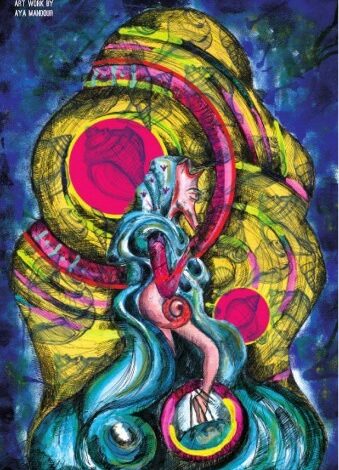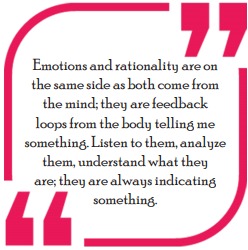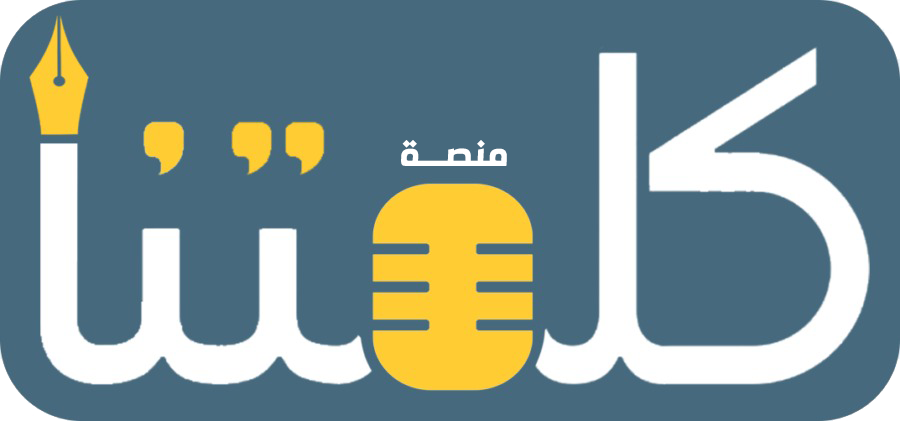To Be or Not to Be: Career Choices in Depth

Written By: Jomana Mandour

Art work by: Aya Mandour
“First, think; second, believe; third, dream; and finally, dare,” said Walt Disney… Easier said than done, right? Well, fear not, as Career Coach Amira Shawky will be guiding you through the steps of acquiring the career you desire within the upcoming lines.
There are three main aspects to be understood: values are derived from personal beliefs, attitudes are the perceptual yield of an evaluation to both the situation and the values, and norms are the societal standards that tend to influence our values. An example of a value is honesty, an attitude is how you exercise honesty, and the societal standard is how society defines honesty.
Values Insider
To begin with, it’s important for each individual to specify their value in life. The term ‘value’ neither means morals nor religious restrictions; in fact, they are the things you hold closely as a person; what’s important to you. We’ll delve further into the meaning of ‘value’ in the upcoming paragraphs.
FYI: Norms vary and change from one social circle to another. Values can change by time; however, they are yours and only yours.
Speaking of change, the reason values change is that the human personality is always evolving, which means that the values will change as well. There are numerous types of values: life values, career values, relationship values, and parenting values. To elaborate on how malleable values can sometimes be, Coach Shawky says that some people can value experience more than other aspects in their life; in this case they will sacrifice some work–life balance at the start of their careers; as time passes, they can focus on other aspects like starting a family, at that moment their values will change and work–life balance will become one of their newly acquired values.
Here comes an intriguing question: do stable values exist? Or are they all changeable? Well, there are core values, ranging from five to seven. Their lack of existence induces a feeling of incoherence and lack of relatability. Should you, however, encounter a situation where there is a conflict between what must be done and your own values, irritation is definitely the emotion having the upper hand in this scenario. At this point, trading-off is your way to go.
“If you can visualise it, if you can dream it, there’s some way to do it.” — Walt Disney. Coach Shawky endorses Disney’s quote, as she too thinks that visualising is a crucial part to knowing your values. As a life coach, she is responsible for helping out with digging-up values. To do so, she gathers a list of 140 up to 480 values. The more nuanced the written value, the different its meaning to each person. While going through this list of values, envisioning your professional life is a way to help decide which values belong to you. Architects draw a blueprint, which is a way of envisioning the object they’re trying to build; the same applies to your career-building process.
Awakening is another step to adopting your values. Since we have previously mentioned that values are changeable in accordance with characteristic development, then being aware of the change that takes place is needed. Important as the career values are, when choosing a
professional path, the primary focus should not only lie on career values, but your values as a person, so you can gain as much fulfilment as possible.
Work–Life Balance
Speaking of fulfilment, careers are not the only things that influence a sense of achievement. For a lot of people, a job is a means to an end, not necessarily the end. Most of us work for income and there is no shame in that; hence, if you prioritize income, you will not overinvest in your work; you will work enough to get the reward you are looking for.
Imbalances are inevitable, where one aspect encroaches over the other. More often than not, work encroaches on your personal life. Here you ought to pause and ask yourself this: why am I working? What are the things I’m looking for in my job and what am I willing to sacrifice to get those things? If you work for either passion or fulfilment, then it becomes more than just a job, which will feed into your relationships, your self-development, as well as your spirituality. It’s a matter of being aware of what you want to achieve through this vessel, which is your job.
Making sure to eliminate situations that conflict with your values as often as possible, facilitates the process of truthfulness towards those values. There are some indirectly abrasive situations that may threaten your values and would make life more challenging. If it is an unavoidable situation, acknowledging the amount of stress it brings is one of the ways to downscale the severity of the situation.
In the spectrum of values, if you rely on one source of value fulfilment, it makes you prone to driving straight-up against a wall; the slightest fluctuation that occurs to that source will dramatically influence the flow of that spectrum. Thus, you can never have too many sources of fulfilment.
Delving into Careers
A job and a career are two different things. Artists, for example, usually have a job that pays the bills, but their career is writing and art. The same applies to everyone else, passion fuels the career.
“Emotions and rationality are on the same side, as both come from the mind; they are feedback loops from the body, telling me something. Listen to them, analyse them. Understand what they are; they are always indicating something.”

Here’s a surprising disclaimer, for all of you who are reading intently: emotions and rationality go together; you won’t find one without the other, which means that once you start feeling dissatisfied with your career path, regrouping to understand where this emotion is emerging from is your way to go. At this point, a problem lies within the levels of fulfilment of the career values.
Hold on . . . Does that mean that sometimes you feel inclined to go down two contradicting routes? And you can’t pick one over the other? Dissonance is a normal human phenomenon, which is why your values are the referees coming to snatch you out of the pool of uncertainty. When facing a moment of dissonance, Coach Shawky advises practicing mindfulness and breathing exercises to help centre yourself. Then, create some space to remind yourself that you’re working towards your values. Eventually, this leads you to chat with yourself in order to understand the source of these emotions and the potential paths these thoughts will lead to.
Keeping the Tank Full
“I don’t want to survive. I want to live.” — The Captain, Wall-E. The captain’s wise words lead only to one conclusion. You need a substantial amount of energy to actually enjoy what you do, rather than having just enough to help you “get by”. And this brings us to one of the most interesting articles published by Harvard Business Reviews that tackles the aspect of managing your energy rather than managing your time.
Tony Schwartz and Catherine McCarthy have introduced four sources of energy and how to use them: the physical battery, which is controlled by how well you sleep, eat and exercise; the emotional battery, which heavily relies on a person’s emotional awareness. The more aware you are, the better you can fill-up your emotional battery. Journaling helps greatly with increasing your awareness; the cognitive battery is next in line. It mainly has to do with how well you focus, and in order to fill it up, cutting down on carrying out multiple tasks at a time does wonders; the spiritual battery comes last, which is the energy responsible for your core purpose. As long as the values and daily tasks are intact, this battery shall stay full.
These are tools to be used when people are demotivated; finding out which battery needs to be replenished and then putting together an action plan to address the drainage and recharge it is one of the options. The physical battery is the easiest to recharge. The rest of the energy sources require a whole lot of self-awareness. That’s why Coach Shawky advises you to work on them with a life coach, should the drainage feel imminent.
Being emotionally aware is a conscious decision that you make every day.
Another way to recharge is to do daily activities known as ‘practices’; one of the easiest activities, and one that works for most people, is practicing gratitude. Simple as it may sound, we rarely appreciate a good cup of coffee, or pay attention to a new flower in the garden next door. In fact, there’s a symbiotic relationship between gratitude and joy. The more you practice gratitude, the more joy you feel, and the more joy you feel, the more you become aware of the little things that happen, which makes you feel grateful.
Determining Your Goals
The part we have been preparing for since the beginning of the article. It takes a great deal of self-awareness to put together the values; however, external pressure is inevitable. Since societal voices get cultivated into our minds, we find it challenging to differentiate between our own voice and the one that got sown into our heads. We have a set of beliefs derived from cultural norms and teachings that we internalise and believe to be truthful; they are sometimes
empowering and others might be limiting. Examine your beliefs; understand which ones are empowering and which ones are limiting.
In order to break free of this cycle, an expert is needed to challenge these beliefs correctly. Some are changeable, others are dogmatic (very difficult to change). If your beliefs are stopping you, you can challenge them; however, they need external interference. Unless you do a whole lot of journaling, for self-development and self-reflection, it is highly challenging to counter your own beliefs.
The issue with careers is that they aren’t as linear as education. People change careers every day, as new professions pop up. An abundance of new titles has surfaced in less than 10 years. They can either serve a purpose or be a means to a purpose.
Nothing is edged in stone; you can come and go as you wish.
Not your usual handbook of does and don’ts, is it? This is a pathway for you to shape your own mindset however you please. Because guess what! Life is way more flexible than you think. Pressure is definitely one of the causes of lack of flexibility; nonetheless, it all relates to your values, your energy levels, and what you choose for your career to be: either an end, or a means to an end.



